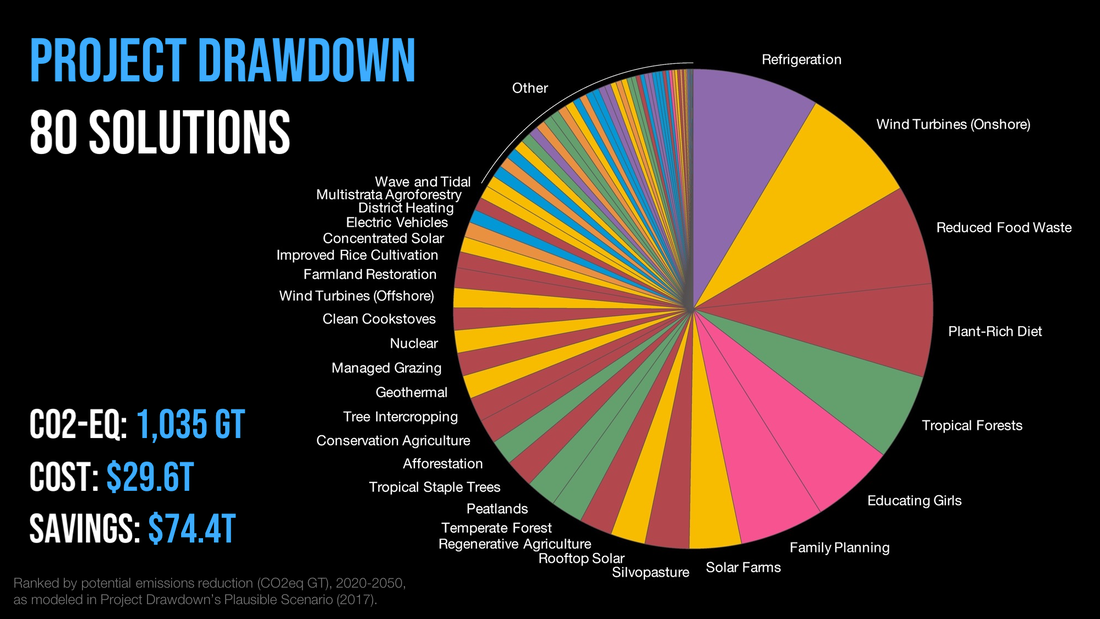The case for raising up women in climate tech
Plus, 15 entrepreneurs who are rocking it. Read More

Four years ago this week, Project Drawdown released groundbreaking research on climate solutions that catalyzed the narrative that reversing global warming is possible. To celebrate that anniversary and underscore what’s needed now, I’m spotlighting 15 women-led ventures at the heart of the climate-tech movement.
After all, one of the most surprising conclusions from our work — disclaimer, I served on Project Drawdown’s founding board of directors — is that empowering women and girls represents the most impactful tool for achieving a climate-safe future. Yes, you read that correctly.
Among the 80 solutions evaluated for their potential to reverse global warming, educating girls and ensuring women have access to family planning resources ranked No. 6 and 7, respectively. By empowering women and girls globally, Project Drawdown calculated that we could avoid 120 billion tons of emissions by 2050. That’s equivalent to roughly 10 years’ worth of China’s annual emissions as of 2014 — an amount that far surpasses the 90 billion ton avoidance potential of Drawdown’s top-ranked solution, refrigerant management.

The reasons are clear: Educated and empowered women generate a cascade of positive outcomes for society and the planet. They marry later, have fewer and healthier children and, when they start to earn more, tend to reinvest that money into their families and communities — 90 percent of their earnings, as Project Drawdown explains, compared to 30 to 40 percent for men. They also are more equipped with the vital skills to adapt and be resilient to climate change when disaster strikes, and to influence how their communities mitigate against it.
From classrooms to boardrooms
It got me thinking: Could we boost the carbon drawdown potential of clean technologies even further by supporting more women-led startups in the burgeoning climate-tech ecosystem?
After all, addressing the climate crisis is the entrepreneurial opportunity of this generation.
Capital is finally starting to flow at a pace commensurate with the urgency and scale of the crisis (emphasis on finally and starting). VC investment in climate tech is growing five times faster than overall VC, with a $60 billion increase in funding over the last seven years. The Biden-Harris administration has committed $35 billion to fund climate-tech breakthroughs and launched the Advanced Research Projects Agency-Climate (ARPA-C) to accelerate technologies that will get the U.S. economy to net-zero emissions by 2050. It would seem that climate tech’s moment has arrived.
Unfortunately, the trend lines for women entrepreneurs aren’t as heartening — at least not yet.
In 2019, just 2.8 percent of VC funding went to women-led ventures — a meager all-time high that fell to 2.3 percent in 2020, according to Crunchbase figures. It makes sense, given that only about 12 percent of decision-makers at VC firms are women, and most still don’t have a single female partner.
And yet, as a recent Harvard Business Review article put it, the business case for more women entrepreneurs is clear. Women founders generate more than twice as much per dollar invested than their male counterparts, exit one year earlier, staff up with 2.5 times more women and tend to start companies that focus more on making a positive contribution to society.
Spotlighting climate-tech sheroes
That’s why this week I’m spotlighting 15 female entrepreneurs who are rocking it in climate tech. The selection features three startups within each clean economy market we focus on at our annual VERGE event — carbon removal, energy, food systems, infrastructure (new this year) and mobility.
I selected for a mix of hardware and software solutions; ideas that inspire me personally within each market; and ventures that connect to one or more of Project Drawdown’s most promising climate solutions.
Carbon removal
Etosha Cave, founder and CSO, Opus 12 (LinkedIn) | Drawdown Solution Sector — Engineered Sinks
Opus 12 is addressing climate change by using carbon emissions to create products traditionally derived from fossil fuels. Under Cave’s fearless leadership, Opus 12 has forged partnerships with companies including NASA, SoCalGas and Shell to deliver products such as carbon negative plastics and jet fuel at scale.
Molly Morse, founder and CEO, Mango Materials (LinkedIn) | Drawdown Solution No. 47 — Bioplastics
Mango Materials has developed a technology that transforms methane into biodegradable plastic pellets that can be implemented in any supply chain and eventually decompose on their own. This impressive team of three female founders, with a combination of backgrounds in engineering, science and innovation, is creating the next generation of sustainable materials to ensure a biodegradable future.
Jennifer Wagner, president, CarbonCure (LinkedIn) | Drawdown Solution No. 36 — Alternative Cement
Cement production is responsible for about 8 percent of the world’s carbon footprint, which CarbonCure is working to reduce by injecting recycled carbon dioxide into concrete and making it stronger and more affordable in the process. With about 300 concrete plants so far, it has partnered with well-known companies such as Stripe, Shopify and LinkedIn, and has investors including Amazon and Bill Gates’s Breakthrough Energy Ventures.
Energy
Andrea Barber, co-founder and CEO, RatedPower (LinkedIn) | Drawdown Solution No. 8 — Solar Farms
“Engineering in minutes, not weeks” is how Barber describes what they’re working to facilitate at RatedPower. Its software is enabling the design and engineering of large-scale solar plants worldwide through a faster, automated and more accurate engineering process.
Ugwem Eneyo, co-founder and CEO, SHYFT Power Solutions (LinkedIn) | Drawdown Solution No. 77 — Grid Flexibility
Growing up in the Niger Delta exposed Eneyo early in life to the realities of both grid failure and the ecological and social devastation caused by the oil and gas industry. Her work at SHYFT Power is leveraging the power of the internet of things (IoT) to connect and intelligently manage clean, distributed energy resources in markets that struggle with grid reliability and resiliency. Congrats are in order for closing a $3.8 million seed round last week.
Steph Speirs, co-founder and CEO, Solstice (LinkedIn) | Drawdown Solution No. 10 — Rooftop Solar
Speirs and her team at Solstice are on a mission to bring affordable renewable energy to the 80 percent of Americans who cannot install rooftop solar. Their unique approach to community solar enrolls households and community organizations in shared solar farms through creative financing innovations that expand access to underserved Americans.
Food
Jasmine Crowe, founder and CEO, Goodr (LinkedIn) | Drawdown Solution No. 3 — Reduce Food Waste
“Hunger is not an issue of scarcity, it’s a matter of logistics,” says Crowe, as the underlying principle for Goodr’s work to help companies achieve their zero waste goals. By providing a platform that enables the collection of surplus food and donates it to nonprofits, Goodr is helping organizations lower their food waste footprint, track analytics to claim tax benefits and provide nutritious food to local communities in need.
Lisa Dyson, founder and CEO, Air Protein (LinkedIn) | Drawdown Solution No. 4 — Plant-Rich Diet
Dyson’s mission to address global food insecurity and sustainably feed 10 billion people by 2050 led her to found Air Protein — which, you guessed it, is the world’s first air-based meat. By combining air, water and mineral nutrients, this revolutionary protein source is pioneering a new approach to feeding our growing population without the strain on natural resources.
Sara Menker, founder and CEO, Gro Intelligence (LinkedIn) | Drawdown Solution Sectors — Food, Ag and Land use
By harnessing the power of big data and artificial intelligence, Gro Intelligence is taking a different approach to solving climate change and global food insecurity simultaneously. Driven to “illuminate the interrelationships between everything happening on Earth,” Menker and her team are creating a comprehensive, holistic and timely picture of global agricultural trends and markets — enabling insights and predictive modeling at a scale never before possible.
Infrastructure
While these startups don’t correlate directly with Project Drawdown’s solution set, they do represent cutting-edge technologies enabling community resilience, smart city networks and circular material economies.
Jessica Matthews, founder and CEO, Uncharted Power (LinkedIn)
Recognized in 2016 for what was, at the time, the largest Series A round raised by a black female founder, Matthews’ work with Uncharted Power is fundamentally reshaping the ground beneath our feet — transforming it into an industrial IoT platform that enables the integrated deployment and management of critical infrastructure, from power grids and broadband to sidewalks and water pipes.
Erin Rothman, founder and CEO, StormSensor (LinkedIn)
Rothman is on a mission to mitigate climate risk through intelligent wastewater infrastructure. Working with cities and counties across the country, StormSensor’s technology is mitigating urban flooding, reducing vulnerabilities in coastal, wastewater and stormwater systems, and helping communities adapt to a changing climate — all at the same time.
Miranda Wang and Jeanny Yao, co-founders, Novoloop (LinkedIn)
“Giving plastic trash new life” is what Wang and Yao are working to do with Novoloop, which transforms packaging waste into high-performance materials used in shoes, cars, homes and more. Their low-carbon manufacturing and advanced recycling system upgrades the most common plastic waste into performance materials worth up to 50 times more.
Mobility
Katya Akulinicheva, CFO, ZeroAvia (Linkedin) | Drawdown Solution No. 43 — Aviation
ZeroAvia is bringing hydrogen-electric power to aviation to enable zero-emission air travel at scale. After first serving as an adviser, Akulinicheva joined the ZeroAvia team to help take the company to new heights — and, like others on this list, it’s already amassed an impressive roster of investors, including Amazon, Shell, Breakthrough Energy Ventures and the Ecosystem Integrity Fund.
Tiffany Chu, CEO and co-founder, Remix (LinkedIn) | Drawdown Solution Sector — Transportation
Born at a Code for America hackathon and starting as a grassroots project, Remix has become an essential planning tool for transportation agencies all over the world, serving more than 350 local governments in 22 countries by bringing datasets from disparate sources together into a unified view. Big congrats to Chu for her pioneering vision and leadership, as the transportation platform was recently acquired by Via for $100 million.
Kameale Terry and Evette Ellis, co-founders, ChargerHelp! (Bios) | Drawdown Solution No. 26 — Electric Vehicles
Utilities report that 30 percent of their EV charging stations are down at any point in time, and many don’t have a specialized workforce to fix them. Terry and Ellis co-founded ChargerHelp! to address that problem. Evette’s prior experience at the Department of Labor shaped the hiring and workforce development component of ChargerHelp!, through which it pays technicians a minimum of $30 per hour and provide shares in the company to ensure employees can afford an EV and participate in the clean economy it is working to create.
At VERGE, we’re leaning in big to nurture and expand the rapidly growing climate-tech ecosystem, including elevating more ventures led by women and Black, Indigenous and people of color (BIPOC) entrepreneurs.
On that note, I’m pleased to announce we recently hired Sherrie Totoki as director of startup programs to develop and lead a whole new era of initiatives at GreenBiz for climate-tech startups (thanks to Sherrie for helping curate this inspiring set of companies). You can expect to hear more from her in the coming months, and to see an increasing number of inspiring women entrepreneurs featured across our events and coverage.













